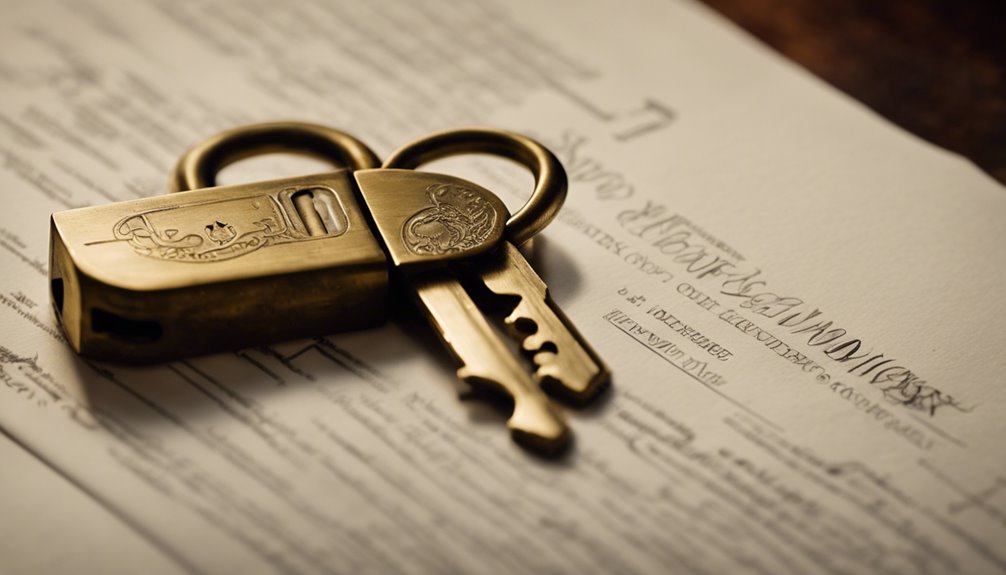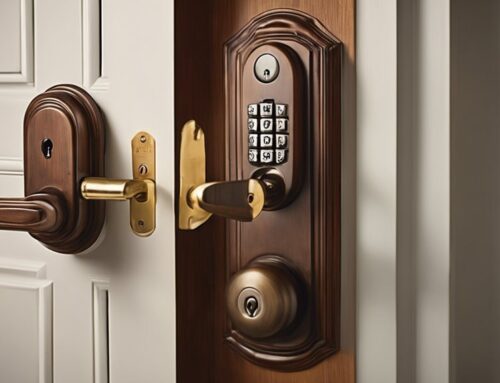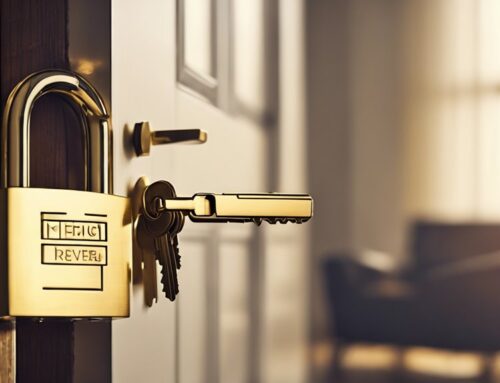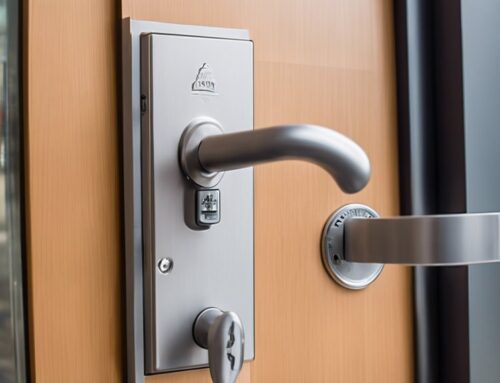Imagine a locksmith in New Jersey who gets caught with a bump key during a routine service call—this scenario underscores the complexities you face regarding lock picking laws. You need to understand not just the tools you use, but also the legalities that govern their possession and application. Steering through the nuances of licensing, supervision, and authorized use is essential to maintaining your professional integrity. But what happens if you inadvertently step into a legal gray area? The implications could be more significant than you think.
Key Takeaways
- Lock picking without explicit property owner permission is illegal and can result in charges of unauthorized entry.
- Possession of bump keys during a burglary is considered a fourth-degree offense with severe penalties, including imprisonment and hefty fines.
- Locksmiths must obtain proper licensing, including training in laws relevant to locksmithing and adherence to ethical practices.
- Direct supervision is necessary for most locksmithing tasks, ensuring compliance with competency standards and legal requirements.
- Continuous education on laws governing locks and locksmithing services is essential for maintaining legal compliance and professional integrity.
Legal Framework Overview

When examining the legal framework regarding lock picking in New Jersey, you should understand that the possession and use of bump keys are tightly regulated. Bump keys allow individuals to open multiple locks through unintended means, which raises significant concerns about property security and burglary.
Consequently, the law prohibits the manufacturing, purchasing, or possession of altered or modified keys, specifically targeting these actions to deter criminal activity. Exceptions are made for law enforcement officers and licensed locksmiths, but only when they're officially performing their duties. Licensed locksmiths can use bump keys responsibly for professional purposes. Key duplication in New Jersey also requires clear permissions and prohibitions to be followed by locksmiths to remain compliant with the law. In New Jersey eviction processes, locksmiths are often called upon to change locks under the supervision of law enforcement to ensure a legal and secure transition of property.
Possessing a bump key while attempting or committing burglary escalates the offense to a fourth-degree crime, potentially resulting in up to 18 months in prison and fines as high as $10,000. Even simple possession without intent carries legal repercussions, classified as a disorderly persons offense with penalties of up to six months imprisonment and $1,000 in fines.
Your intent plays a critical role in determining the legality of possessing bump keys. While locksmiths and law enforcement may legally use these tools, doing so without consent from the property owner is illegal.
For legitimate purposes, such as locksmithing, you must guarantee you obtain permission to avoid facing criminal charges.
This legal framework, outlined in Title 2C of the New Jersey Statutes, is designed to bolster security while preventing misuse of lock-picking tools. Familiarize yourself with these laws to navigate the complexities of your rights and responsibilities within this context.
Licensing Requirements for Locksmiths

To practice locksmithing legally in New Jersey, you must meet specific licensing requirements that guarantee both competency and ethical conduct.
First, you need to be at least 18 years old, possess a high school diploma or an equivalency certificate, and demonstrate good moral character. Importantly, you mustn't have any convictions for first, second, or third-degree crimes within the last ten years. A criminal history background check, including fingerprints, is also mandatory.
Educationally, you need to pass the locksmithing examination as outlined in N.J.A.C. 13:31A-2.3. Additionally, you must have completed either a two-year apprenticeship in locksmithing services, approved by the Bureau of Apprenticeship and Training of the U.S. Department of Labor, or accumulated three years of practical hands-on experience, which equates to 5,040 hours of work, primarily focusing on tasks like lock picking and key making. Furthermore, you must accumulate 36 months of experience to meet the practical experience requirement.
More so, you're required to undergo specific additional training—two hours each in Barrier Free Subcode, the New Jersey Uniform Construction Code, the Americans with Disabilities Act Code, and industrial safety. In New Jersey, lock changes in residential properties are governed by specific laws that landlords and tenants must be aware of. The locksmith licensing process is in place to ensure practitioners are well-versed in these critical areas before providing their services.
It's also essential to complete two hours of training related to New Jersey laws governing burglar, fire alarm, and locksmith services.
When applying, you can download the application from the Fire Alarm, Burglar Alarm and Locksmith Advisory Committee's website or use the MyLicense Online Licensing system.
Be prepared to pay a non-refundable fee of $150. Licenses are valid for three years and require renewal to maintain your professional standing.
Supervision and Compliance Guidelines

Supervision and compliance guidelines play an essential role in ensuring that locksmithing services are performed within the legal framework in New Jersey. As a business qualifier, you hold the primary responsibility for overseeing all locksmithing operations. This includes ensuring full compliance with Federal, State, and local laws. Regular and continuous presence at your principal office or job sites is non-negotiable; it's crucial for effective oversight of your employees. For functions classified under indirect supervision—like opening existing locks or repairing locks—you must always be reachable by electronic means. However, direct supervision is mandatory for all other locksmithing services, ensuring you're present on-site for constant guidance and conducting a final inspection once the work is completed. Your approach to supervision should reflect both the complexity of the tasks and the competency level of your employees. Competency isn't just a formality; it directly affects supervision. Employees working unsupervised must meet specific competency standards, while all locksmiths must carry a Committee-issued identification card containing essential personal and business details. Moreover, maintaining business compliance includes accurate record-keeping, ensuring your vehicles are marked according to regulations, and carrying the required insurance. Locksmiths in New Jersey must also adhere to wage laws, ensuring they pay their employees at least the state minimum wage and comply with any applicable overtime rules. In New Jersey, landlords and tenants must understand their rights and responsibilities regarding lock rekeying to avoid legal issues. To uphold these standards, you must ensure that there is one business qualifier for every ten locksmithing employees you supervise. Stay proactive in reporting any new hires to the Committee within 30 days, along with their documentation. In adhering to these guidelines, you safeguard not only your business but also the liberties and responsibilities associated with the locksmith profession.
Penalties for Violating Laws

Ensuring compliance with locksmithing regulations isn't just about adherence to guidelines; it also involves understanding the consequences of legal violations. Violating New Jersey's laws regarding lock picking can lead to severe penalties. It's vital for you, as a locksmith, to be aware of these repercussions to avoid legal pitfalls.
Here are three key penalties you should keep in mind:
- Bump Key Violations: Possession of a bump key during or in an attempt to commit burglary is classified as a fourth-degree crime. This could result in up to 18 months imprisonment and fines reaching $10,000.
- Manufacture and Purchase Laws: If you're found manufacturing or purchasing bump keys, the same fourth-degree classification applies if linked to burglary. This carries the same potential penalties as possession during a burglary.
- Disorderly Persons Offenses: If you're caught with a bump key that isn't related to burglary, you face a disorderly persons offense, which could lead to up to 6 months in jail.
Beyond these penalties, a conviction can leave you with a criminal record, possibly involving community service or restitution. High-security locks in New Jersey are governed by detailed standards that also impact locksmith practices and compliance requirements. To ensure you meet these standards, familiarize yourself with the lock safety standards set by New Jersey for both commercial and residential environments.
Every instance may differ depending on specific circumstances, and repeat offenses can escalate consequences. As a result, understanding the legal landscape and its implications isn't just wise—it's essential for your practice and freedom in the locksmithing field.
Authorized Use of Lock Picking Tools

Authorized use of lock picking tools is essential for maintaining professionalism and legality within the locksmithing field. To operate legally, you must be a licensed locksmith in New Jersey, fulfilling requirements laid out in section 7 of P.L.1997, c.305. This involves being at least 18 years old with a commendable moral character, as well as acquiring practical experience or completing a relevant apprenticeship.
Moreover, your adherence to training in various codes, including the New Jersey Uniform Construction Code, is vital. Your compliance extends beyond your licensure; you're responsible for upholding all applicable federal, state, and local laws. Ensuring that your locks meet ADA compliance standards is essential for accessibility and inclusivity in your business operations.
It's also important to remember that authorized use of lock picking tools isn't limited to licensed locksmiths. Law enforcement officers may utilize these tools in the line of duty, exempt from certain restrictions. However, they too must operate within official capacities and guidelines.
Additionally, you can employ lock picking tools only with explicit permission from property owners. Attempting to pick a lock without this authorization can lead to serious legal consequences, such as charges of illegal entry. Ethical practices emphasize the need for lawful intent, ensuring your actions contribute to freedom rather than infringe on others' rights.
For locksmith businesses, compliance means maintaining direct or indirect supervision of locksmithing activities. Upholding these regulations not only protects your license but also enhances your reputation and service quality in a field that values trust and integrity(Top Rated Nationwide 24 Hour Mobile Locksmith Service Provider).
Frequently Asked Questions
Can I Use Lock Picking Tools for Personal Use?
Yes, you can use lock picking tools for personal use, but only if you've got permission from the property owner.
Possessing these tools isn't illegal unless you intend to misuse them.
Make sure your actions remain lawful and ethical, avoiding unauthorized access to others' property.
Being aware of this distinction is vital.
How Can I Report Illegal Use of Lock Picking Tools?
If you suspect illegal use of lock picking tools, it's essential to act like a vigilant guardian.
First, contact local law enforcement, detailing the situation—describe the tools, location, and any suspicious behavior.
Cooperate fully with officers to guarantee your concerns are documented and investigated.
If anonymity suits you better, use tip lines.
Are There Specific Training Programs for Locksmiths in New Jersey?
In New Jersey, you've got several specific training programs available for aspiring locksmiths.
You can choose from hands-on apprenticeships, classroom instruction, or even online courses that cover essential locksmithing skills. Certification programs validate your expertise and enhance your credibility in the field.
Local locksmith companies often offer apprenticeship opportunities too, ensuring you gain practical experience. Engaging in these programs not only broadens your knowledge but also positions you competitively within the industry.
What Should I Do if My Locksmith License Is Revoked?
If your locksmith license's been revoked, remember that "every cloud has a silver lining."
First, take a breath and reflect on the reasons behind the revocation. Wait a year before applying for reinstatement.
Then, submit your application, complete any mandatory education, and prepare for assessments.
Finally, make certain you comply with notification requirements during the process.
It's crucial to demonstrate growth and accountability to regain your professional freedom.
Can Locksmiths Work Without Direct Supervision at All Times?
Locksmiths can't work without direct supervision for all tasks.
While certain functions allow for indirect supervision, like making keys or repairing locks, you must always have a licensed supervisor present for work that's not covered under indirect supervision.
This guarantees compliance with legal standards and maintains the integrity of your services.
Conclusion
In the thrilling world of locksmithing, maneuvering through New Jersey's regulations is almost as tricky as opening a door without a key. You wouldn't want your career to hinge on a bump key blunder. So, arm yourself with knowledge—know your licenses, comply with the laws, and don't let a moment of oversight land you in hot water. Stay sharp, stay ethical, and remember, the only thing you should be opening is your potential as a professional locksmith.









